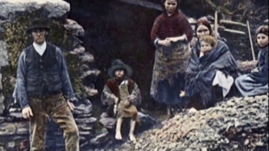Teachers' Domain - Digital Media for the Classroom and Professional Development
User: Preview

Source: Faces of America: "A Very Sad Period in Irish History"


Faces of America on VITAL is made possible by The Cola Company.
Funding for Faces of America on PBS was provided by The Coca-Cola Company and Johnson & Johnson. Additional funding was provided by the W.K. Kellogg Foundation, Carnegie Corporation of New York, The Atlantic Philanthropies, and The John D. and Catherine T. MacArthur Foundation. Additional support is provided by the Corporation for Public Broadcasting and PBS.
A Very Sad Period in Irish History Transcript (Document)
Henry Louis Gates Jr.: Your great-great grandfather Michael Garin and his parents left Limerick at a crucial moment in Irish history, in the early 1850s. Do you know what was happening…
Stephen Colbert: The famine!
Gates: You got it.
Narration: Michael Garin was just a little boy when Ireland’s potato crop failed for several years in a row, devastating the country’s poor.
O’Malley: There wasn’t enough food to go around. The working class people were totally poverty stricken and many of them died of extreme hunger. It was a very sad period in Irish history.
Tony Browne: There must be over a thousand paupers buried here who would have died in the years 1845, 46, 47. They were usually buried in the early hours, roughly around half six in the morning, where there would be two people carrying a cart with the body on the back. No priest would officiate at prayers. Nobody would come. Nobody was interested, really, in paupers… And if the Garins had stayed in Limerick, maybe they would have ended up here…we’ll never know.
 Loading Standards
Loading Standards